10 Existential Films for Philosophy Students
What is an Existential Film?
It is important to state, first and foremost, that the title is a bit of a misnomer. In a sense, many (if not most) narrative films could be considered existential, or could have existentialist theories applied to them. However, there are not as many films that deal directly with existential principals as an essential element of the plot; nor are there as many films in which existential overtones and themes are overt and readily identifiable to the keen observer.
Audiences and film theorists are able to extract meaning from film, and analyze narrative and imagery through an existential lens. So, if a devout and self-described existentialist is watching a film, they would surely read its narrative through an existential worldview, and therefore, their analysis, but not necessarily the film itself, would be existential. They may decry the narrative as being anti-existentialist, or they may praise it for producing themes that align with existentialist ideas and interpretations. However, reading films with these kinds of preconceived ideas of what they should or should not be is not helpful, at least not for the sake of defining what constitutes an existential film.
Therefore, instead of making a list of films to which existential theories can apply (the list would be never ending), this list will be comprised of the top ten films that address or produce existential themes and inquiries in a direct way. This is by no means a comprehensive list. There are various films that did not make the cut (see “Honorable Mentions” below), but the following ten films are both superb in overall quality and share the attribute of addressing Existentialism as a subject of study head on, with little need for viewer extraction.
Before we go about listing the films, it must be addressed that Existentialism is a rather broad and far-reaching subject. So, if we are to make such a list, first we must define what is meant by the term. Even among existentialists, there are disagreements about the precise doctrines and tenets. But for the purposes of clarity and preciseness, our definition will be confined to Existentialism as Jean-Paul Sartre describes it in his essay, Existentialism is a Humanism.
Sartre summarizes the existentialist view by stating that existence precedes essence. That is to say, a human first exists, and then later defines him or herself through their own actions.
“…action presupposes that there is a plurality of possibilities, and in choosing one of these, they realize that it has value only because it is chosen.”
“Man is nothing else but what he purposes, he exists only in so far as he realizes himself…he is therefore nothing else but the sum of his actions, nothing else but what his life is.”
Sartre, being an atheist, presupposes that God does not exist, though he explains that this is not a necessary prerequisite for Existentialism. In Sartre’s view, the absence of God, or, for the theist, the absence of complete determinism, creates the absurdity of existence, and causes anguish in the individual.
“The existentialist…finds it extremely embarrassing that God does not exist, for there disappears with Him all possibility of finding values in an intelligible heaven…For if indeed existence precedes essence, one will never be able to explain one’s action by reference to a given and specific human nature; in other words, there is no determinism – man is free, man is freedom. Nor, on the other hand, if God does not exist, are we provided with any values or commands that could legitimize our behavior. Thus we have neither behind us, nor before us in a luminous realm of values, any means of justification or excuse. – We are left alone, without excuse. That is what I mean when I say that man is condemned to be free. Condemned, because he did not create himself, yet is nevertheless at liberty, and from the moment that he is thrown into this world he is responsible for everything he does” (Sartre).
In short, Existentialism espouses the concept that a human is defined by their actions, and an individual creates the meaning in their life through the choices they make. It is this emphasis on subjectivity, freedom of choice, and meaning attached to the individual that define Existentialism. Anguish is a necessary byproduct of the existential doctrine, as every person is completely responsible for their own actions, values, and meaning, and is aware of this responsibility. This knowledge leads to anguish, as there is no determining power or higher set of morals to justify our actions, leaving us alone and without guidance outside of ourselves.
So, now that we have a general definition of Existentialism, it still begs the question: what constitutes an existential film? To create a concise list, including only those films that can unequivocally be considered existential, the criteria are as follows:
- The film must have a fictional narrative (documentaries about existential philosophy will not be included).
- The film must have at least one human character, with the narrative generally being told either from their perspective or with a story that revolves around their actions and environment.
- Through the necessary elements of filmmaking (editing, dialogue, mise-en-scene, etc.), the filmmaker must portray the central character as existing in an undetermined world, with a plurality of choices to make.
- The character must take actions that have consequences, and be aware that there is no power outside of themselves that determines their actions or circumstances.
- The character(s) must undergo an existential crisis. That is to say, there must be, to one degree or another, anguish present as a result of the responsibility of action in the face of an absurd and undetermined existence.
The following is a list of 10 films that meet the above criteria, and, are excellent in overall quality and craftsmanship.
10 Existential Films for Philosophy Students
10. I Heart Huckabees (David O. Russell, 2004)
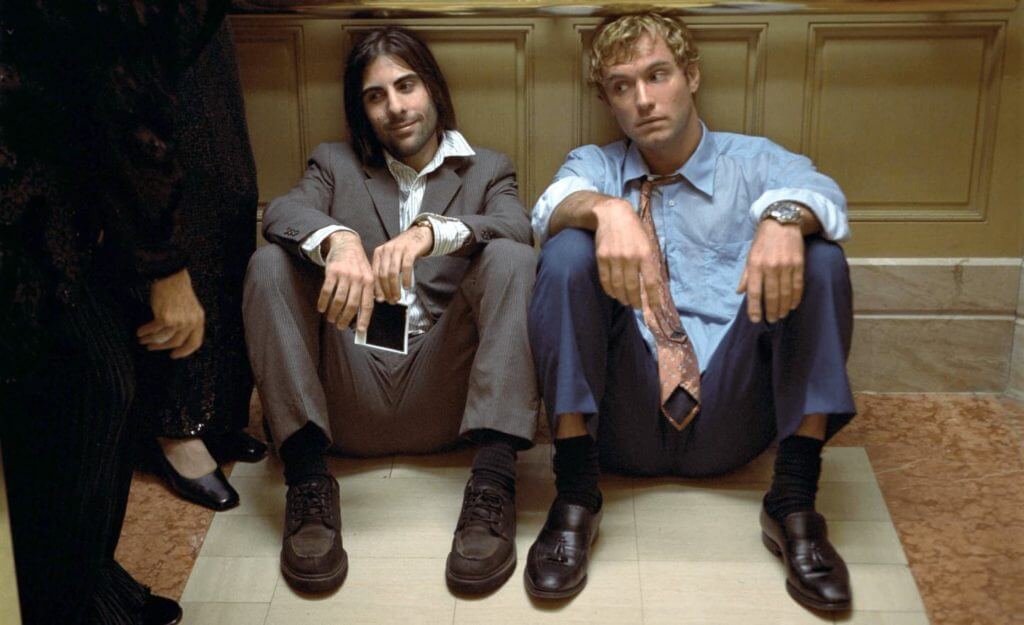
I Heart Huckabees is billed as an “existential comedy,” and is one of the few films on this list where philosophical debate makes up a large part of the dialogue. The story follows Albert Markovski (played by Jason Schwartzman), as he attempts to find purpose, both for himself and the universe as a whole, and make sense of certain strange coincidences in his daily life. He hires two “existential detectives” (played by Dustin Hoffman and Lily Tomlin) to follow him around and solve his problem. Albert begins to lose faith in the detectives, and is enticed by a former student of theirs, Caterine Vauban (played by Isabelle Huppert), who espouses an opposing view.
I Heart Huckabees is available for purchase on amazon.com here.
9. Wild Strawberries (Ingmar Bergman, 1957)

In Wild Strawberries, Isak Borg (played by Victor Sjostrom) is an elderly professor and former country doctor in rural Sweden who sets out on a long car ride to receive a prestigious award from his alma mater. Isak’s pregnant daughter-in-law, Marianne (played by Ingrid Thulin), comes with him, despite not liking her father-in-law, and despite her desire to separate from her husband and Isak’s only son. The pair meet various people along the way, and these encounters trigger memories (and occasionally nightmares) for Isak, who, now very old and near to death, begins to evaluate his life. Looking back at the sum of his actions, Isak develops an image of himself as an isolated old man, brought to this point by the events in his life and the choices he has made over the years.
Wild Strawberries is available for purchase on amazon.com here.
8. Solaris (Andrei Tarkovsky, 1972)
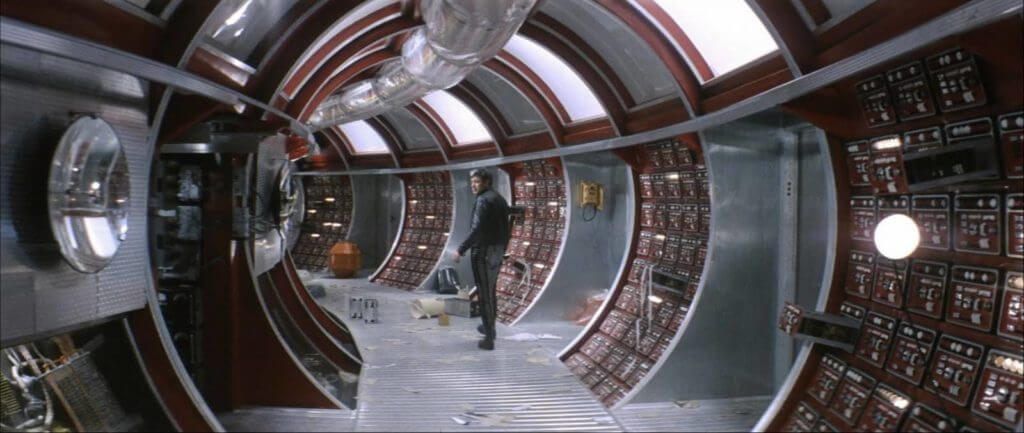
Probably the most cryptic and cerebral film on this list, Solaris is the story of Kris Kelvin (played by Donatas Banionis) and his encounters with a bizarre and terrifying universe. Kris is a psychologist who must travel to a distant space station, which, after years researching the nearby planet Solaris, has begun to send cryptic messages back to Earth. Kris grapples with the decision to leave his home, as it will require him to leave his father with the knowledge that they will probably never see each other again. Once aboard the space station, Kris finds it in disarray, and the remaining crew unhelpful. Kris begins experiencing strange visions from his past as the mystery of Solaris slowly unfolds.
Solaris is available for purchase on amazon.com here.
7. The Seventh Seal (Ingmar Bergman, 1957)

The second Bergman film to appear on this list, The Seventh Seal is set during the Black Death and follows a disillusioned knight (played by Max Von Sydow) who, upon returning to Sweden from the Crusades, begins a game of chess with the personification of Death (played by Bengt Ekerot). During the knight’s journeys, he admits that his life is without meaning, and that he wishes to perform “one meaningful deed.” The knight and his band of followers encounter a variety of people along the way, each offering varied moral convictions and insights of death and the afterlife. “The Seventh Seal,” which is referenced at the beginning and end of the film, comes from the Bible: “And when the Lamb had opened the seventh seal, there was silence in heaven about the space of half an hour.”
The Seventh Seal is available for purchase on amazon.com here.
6. 2001: A Space Odyssey (Stanley Kubrick, 1968)
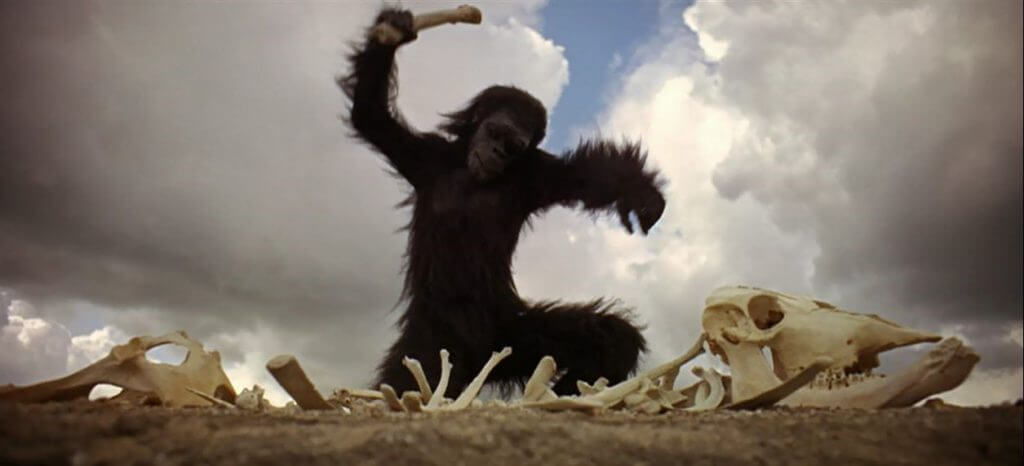
Stanley Kubrick’s science-fiction epic, 2001: A Space Odyssey is most often noted for its dazzling visuals and infamous “villain,” Hal 9000, but 2001 is also a reflection on human endeavor, and how it stands in relation to evolution that has spanned millennia. The protagonist of the film, Dr. David Bowman, lives and works on a spacecraft that is operated and maintained by a highly advanced computer system named Hal 9000, which the crew affectionately calls “Hal.” However, when the computer structure, which is supposed to be a perfect system, begins showing signs of error, and the crew contemplates disconnecting it, Hal takes action to rectify the situation.
2001: A Space Odyssey is available for purchase on amazon.com here.
5. The Big Lebowski (Joel and Ethan Coen, 1998)

The Coen Brothers’ cult classic comedy, The Big Lebowski, is a story that draws inspiration from Howard Hawks’ film noir, The Big Sleep (1949), itself an adaptation of Raymond Chandler’s novel of the same name. Jeffery Lebowski, (played by Jeff Bridges) also known as “The Dude,” is a slacker whose mantra is “The Dude abides.” After being mistaken for a wealthy businessman with the same name, two hired thugs pee on his favorite rug, which embroils The Dude in a mystery surrounding the real Jeffery Lebowski’s unpaid debt to a loan shark. With the help of his overly aggressive friend, Walter Sobchak (played by John Goodman), The Dude attempts to solve the mystery and hopefully get a replacement rug in the process. While the Dude’s laissez-faire attitude may seem antithetical to the idea that individual action drives meaning and purpose, in actuality, it is his decision to be swept up by outside forces that defines him, and thus make him an exemplary existential protagonist.
The Big Lebowski is available for purchase on amazon.com here.
4. Anomalisa (Charlie Kaufman & Duke Johnson, 2015)

Anomalisa ruminates on the concept of subjectivity, and the isolation that naturally arises from it. This stop-motion animation film tells the story of a despondent customer service expert, Michael Stone (voiced by David Thewlis) who sees everyone, including his wife and son, as identical white men with identical voices. While on a work trip in Cincinnati, Michael hears a woman with a unique voice, and is subsequently enamored with her and her perceived individuality. Though Michael is seemingly at the mercy of his depression, the film focuses on the power of his subjectivity, and the weight of past actions on Michael’s conscience.
Anomalisa is available for purchase on amazon.com here.
3. The 400 Blows (Francois Truffaut, 1959)

A seminal film of the French New Wave, The 400 Blows is the debut film of famed director Francois Truffaut. Drawing heavily from his own childhood, Truffaut tells the story of Antoine Doinel, a French youth whose rebellious nature causes him to clash with his parents, teachers, and society as a whole. Dissatisfied with his life and the constraints of society, Antoine is a reflection of the singular identity, adrift in an existence without direction. Truffaut focuses on Antoine’s subjectivity, and his many attempts, both successful and unsuccessful, to break from the course that society has set for him.
The 400 Blows is available for purchase on amazon.com here.
2. The Bicycle Thieves (Vittorio De Sica, 1948)
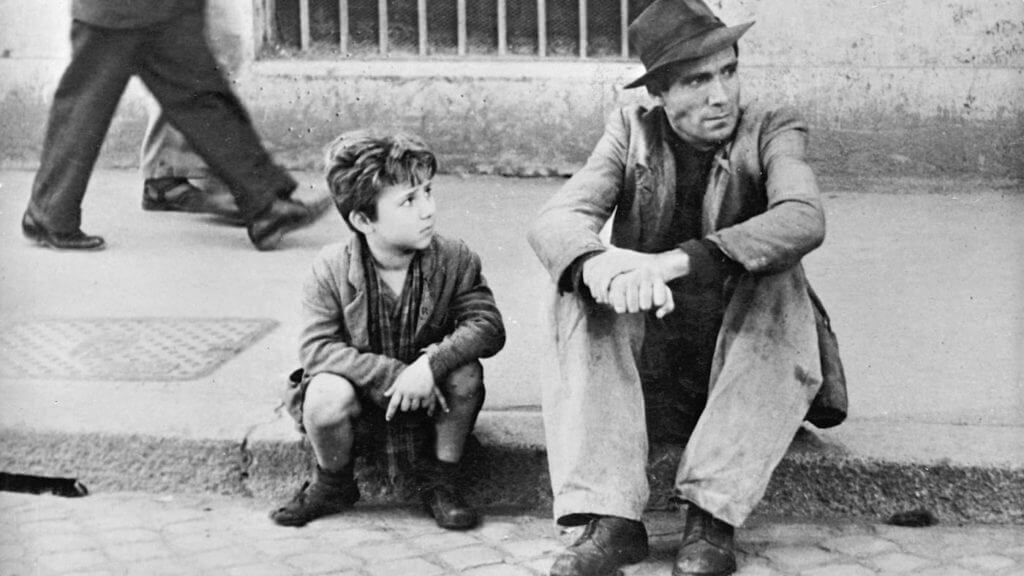
Part of the Italian films collectively known as Italian Neorealism, The Bicycle Thieves is a story of loss and desperation. In post World War II Rome, a man named Antonio (played by non-professional actor Lamberto Maggiorani), is desperate for work to provide for his family. One day, he is offered a job for which he will need a bicycle. He and his wife, Maria (Lianella Carell), decide to pay for one by selling a prized family heirloom. They are overjoyed by their good fortune, but when the bicycle is stolen, and Antonio struggles to track down the thief, he must decide whether to abandon his scruples, or let his family starve. Italian Neorealism was, at its core, a film movement that sought to show life as it is, and to shed light on human experiences, particularly those of the poor working class.
The Bicycle Thieves is available for purchase on amazon.com here.
1. Things to Come (Mia Hansen-Løve, 2016)

French filmmakers have a long history of writing and directing existential films, and one of the most recent and well crafted among them is Things to Come, a film that is essentially about philosophy and the impact that self-reflection and contemplative thought have on our lives. Isabelle Huppert stars as Nathalie, a middle-aged philosophy professor who is suddenly hit with two tragedies, one after the other. Nathalie must pick up the pieces of her life and attempt to make sense of the chaos, while still clinging to the philosophical theories that define her.
Things to Come is available for purchase on amazon.com here.
Honorable Mentions:
Another Earth (Mike Cahill, 2011)
The Vanishing (George Sluizer, 1988)
Requiem for a Dream (Darren Aronofsky, 2000)
Adaptation (Spike Jonze/Charlie Kaufman, 2002)
Hiroshima, Mon Amour (Alain Resnais, 1959)
Casablanca (Michael Curtiz, 1942)
American Beauty (Sam Mendes, 1999)
So there you have it, 10 existential films for philosophy students. Again, this is not a comprehensive list, so if you think that there are other films that should be included, feel free to leave a comment! Additionally, if you’d like to read more about Existentialism, check out this essay: On Sartre and the Meaning of Human Existence.
Sources:
Sartre, Jean-Paul, and Philip Mairet. Existentialism and Humanism. London: Methuen, 1948. Print.
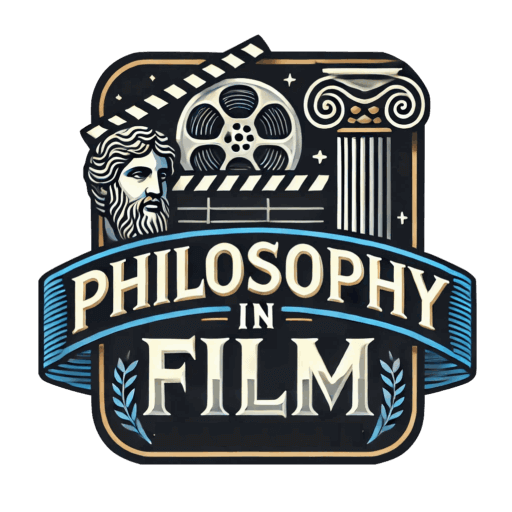
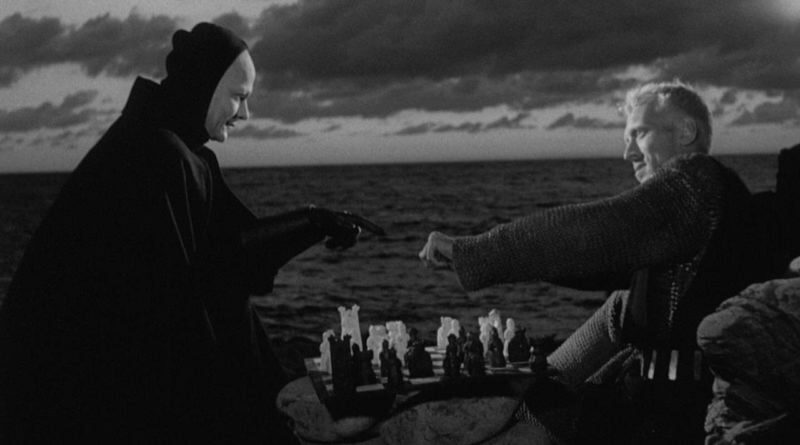
I cannot believe you didn’t include Waking Life. It’s not just a film about and PACKED FULL with existential ideas, so much so that without existentialism it’d have no plot, it’s all discussion that goes deeply into the ideas, instead of just shallowly talking about them as if they exist without exploring them.
Also, all of the Charlie Kaufman films deal with existentialism, and they’re all really good films.
Mulholland Drive was an exceptional film that’s all about one’s last view of the world.
Fearless was a film from 1993 with Jeff Bridges where he’s trying to make sense of his surviving a plane crash and being treated as a hero after he went through what he did.
Ararat is an incredibly thought provoking film about the real history of the Armenian genocide. It’s absolutely the best film that Atom Egoyan ever made.
Ponette will break anyone’s heart….and have you balling in just the first scene. It’s a french film that stars very young children. Ponette is 4 years old when her mother dies and the film watches how her and her dad get used to the idea and try to move on. It got two thumbs up from Siskel and Ebert. This is a film about a child, packed with child actors, but for adults. Guaranteed you’ve seen nothing like it.
Nothing is a comedy about two roommates who suddenly find that everything outside of their house had disappeared, and how they deal with it.
Stardust Memories is one of my favorite films of all time. It’s a Woody Allen film about himself…..a famous director who doesn’t want to make funny movies anymore but is trying to figure out how to do something more meaningful.
Those are just a small few existential films that I’d highly suggest.
Seconding A Waking Life!
Nice list. I particularly liked the inclusion of the Bicycle Thieves and The Seventh Seal. I would have also included such films as Jacob’s Ladder and The Trial. Check out also my similar list if you like: https://dbmoviesblog.wordpress.com/2016/04/08/20-must-see-philosophical-films/
Have a look at ‘Breaking Away – jam packed with subtle existential themes. Can’t get more existential than the quote by Mr. Stoller, Dave’s Dad: “No I’m not glad to be alive, I’m glad I’m not dead, there’s a difference.”
Harold & Maude ?
“Tree of Life” !!!!